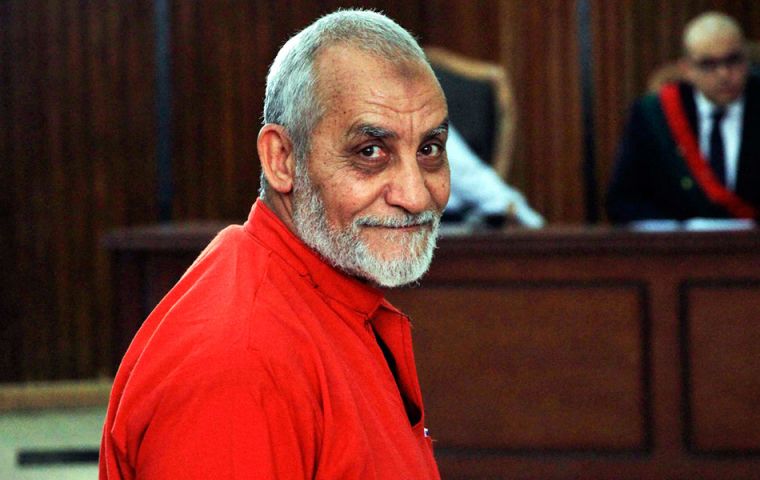MercoPress. South Atlantic News Agency
Arab countries isolate Qatar; Emirate is accused of cozying to Iran and supporting terrorism
 A Cairo court sentenced the group's spiritual leader, Mohammed Badie, to life in prison last month for murder and violence in connection with nationwide protests
A Cairo court sentenced the group's spiritual leader, Mohammed Badie, to life in prison last month for murder and violence in connection with nationwide protests  Riyadh reported it broke diplomatic relations, as all land, sea and air contacts with Qatar to protect itself from “the dangers of terrorism and extremism.”
Riyadh reported it broke diplomatic relations, as all land, sea and air contacts with Qatar to protect itself from “the dangers of terrorism and extremism.” Arab countries began cutting off diplomatic relations with the Persian Gulf emirate of Qatar on Monday, accusing it in general terms of supporting terrorism. Egypt accused Qatar specifically of supporting the Muslim Brotherhood, Egypt's state news agency reported.
A Cairo court sentenced the group's spiritual leader, Mohammed Badie, to life in prison last month for murder and violence in connection with nationwide protests in August 2013 after the military ousted elected Islamist leader Mohammed Morsi.
The official Saudi news agency reported that Saudi Arabia broke diplomatic relations — as well as all land, sea and air contacts — with Qatar to protect itself from “the dangers of terrorism and extremism.”
Saudi Arabia “urges all brotherly countries and companies to do the same,” according to the official report.
Bahrain, meanwhile, accused Qatar of backing terrorism and interfering in Bahrain's internal affairs. Like Saudi Arabia, it cut air and sea contacts and added that it was giving its citizens in Qatar 14 days to leave.
A fourth country, the United Arab Emirates, echoed the same accusations and accused Qatar of undermining regional stability.
Qatar said last week that hackers had posted fake remarks by its emir, Sheik Tamim bin Hamad al-Thani, criticizing some leaders of fellow Gulf Arab states and calling for an easing of tensions with Iran, a regional adversary.
But several Gulf Cooperation Council states rejected Qatar's explanation, leaving local media to unleash a barrage of attacks accusing the emir of cozying up to Iran. Qatar has been long accused of maintaining relations with and backing Islamist movements and groups in the region.
U.S. Secretary of State Rex Tillerson, speaking Monday at a bilateral meeting with Australian officials in Sydney, said the U.S. believes it is important the Gulf Cooperation Council — comprising Bahrain, Kuwait, Oman, Qatar, Saudi Arabia and the United Arab Emirates — remains intact.
Tillerson said he does not expect the diplomatic spat will “have any significant impact, if any impact at all, on the unified, the unified fight against terrorism in the region or globally.”
“I think what we're witnessing is a growing list of some irritants in the region that have been there for some time,” Tillerson told reporters during a press conference. “And obviously they have now bubbled up to a level that countries decided they needed to take action in an effort to have those differences addressed”.




Top Comments
Disclaimer & comment rulesCommenting for this story is now closed.
If you have a Facebook account, become a fan and comment on our Facebook Page!